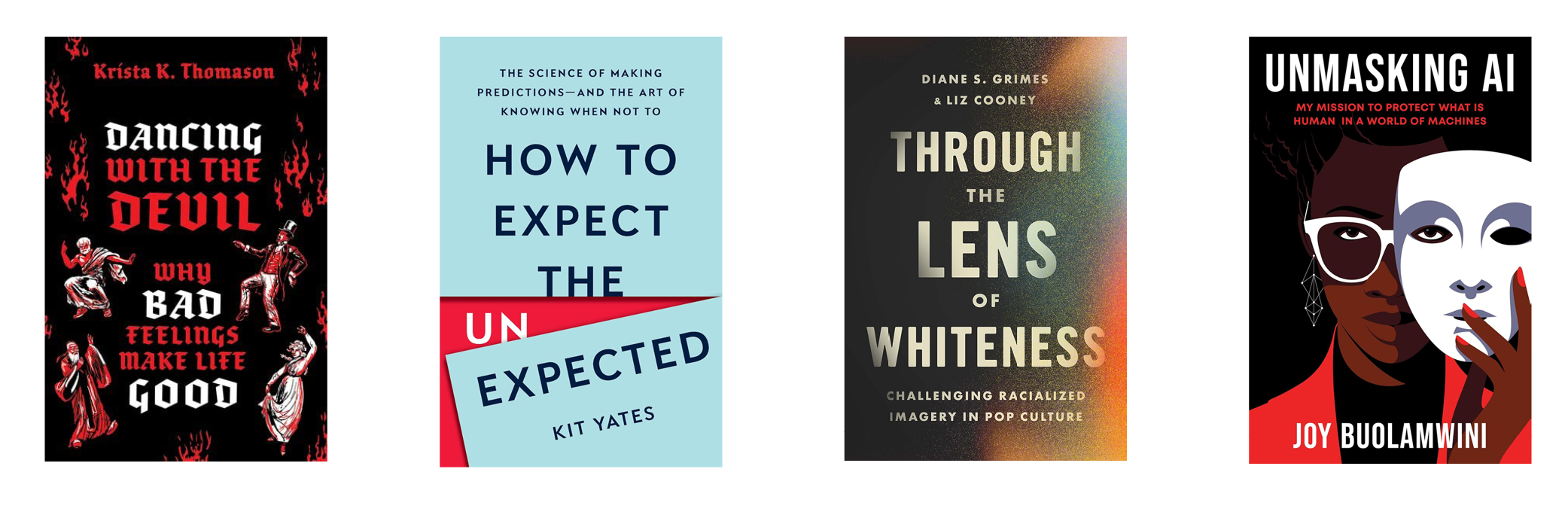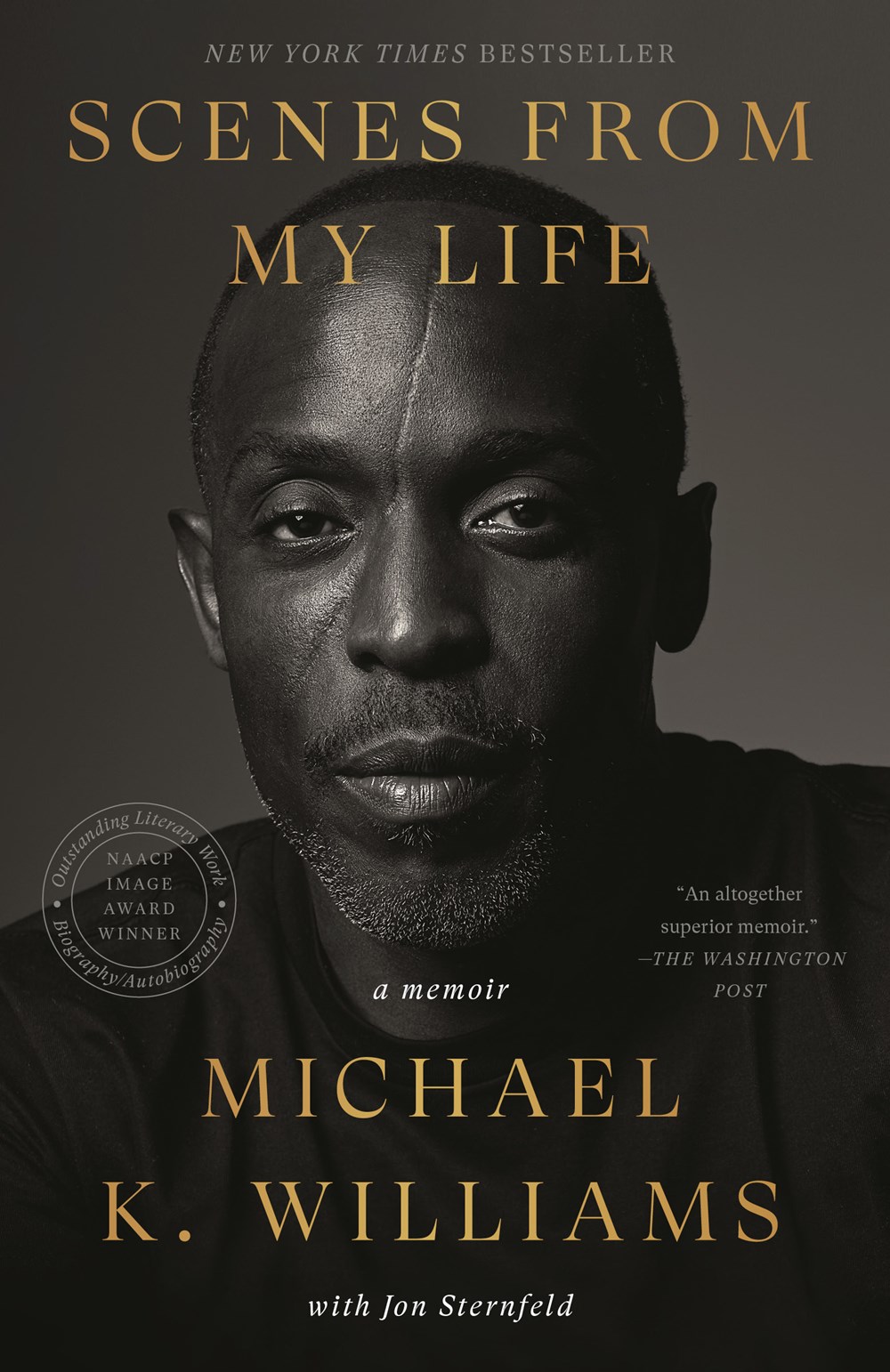October 31, 2023
Finding the right book at the right time can transform your life or your organization. We help you discover your next great read by showcasing four recently released titles each week.
The books are chosen by Porchlight's Managing Director, Sally Haldorson, and the marketing team: Dylan Schleicher, Gabbi Cisneros, and Jasmine Gonzalez. (Book descriptions are provided by the publisher unless otherwise noted.)
This week, our choices are:

Sally’s pick: Dancing with the Devil: Why Bad Feelings Make Life Good by Krista K. Thomason, Oxford University Press
We tend to think about bad feelings--feelings like anger, envy, spite, and contempt--as the weeds in life's garden. You may not be able to get rid of them completely, but you're supposed to battle them as best you can. The best garden is one with no weeds. The best life is one with no bad feelings. But this isn't quite right, according to philosopher Krista K. Thomason. Bad feelings are the worms, not the weeds. They're just below the surface, and we like to pretend they aren't there, but they serve an important purpose. Worms are just as much a part of the garden as the flowers, and their presence means your garden is thriving. Gardens aren't better off without their worms, and neither are we. The trick is learning how to enjoy our gardens, worms and all.
Thomason draws on insights from the history of philosophy to show what we've gotten wrong about bad feelings and to show readers how we can live better with them. There is nothing wrong with negative emotions per se. Their bad reputation is undeserved. Negative emotions are expressions of self-love--not egoism or selfishness, but the felt attachment to ourselves and to our lives. We feel negative emotions because our lives matter to us. After explaining this, Thomason helps us look at individual bad feelings: anger, envy and jealousy, spite and Schadenfreude, and contempt. As she demonstrates in this tour of negative emotions, these feelings are valuable parts of our attachment to our lives. We don't have to battle negative emotions or "channel" them into something productive. Bad feelings aren't obstacles to a good life; they are part of what makes life meaningful.
Gabbi’s pick: How to Expect the Unexpected: The Science of Making Predictions—and the Art of Knowing When Not To by Kit Yates, Basic Books
How can you be 100 percent sure you will win a bet? Why did so many Pompeians stay put while Mount Vesuvius was erupting? Are you more likely to work in a kitchen if your last name is Baker? Ever since the dawn of human civilization, we have been trying to make predictions about what the world has in store for us. For just as long, we have been getting it wrong. In How to Expect the Unexpected, mathematician Kit Yates uncovers the surprising science that undergirds our predictions—and how we can use it to our advantage.
From religious oracles to weather forecasters, and from politicians to economists, we are subjected to poor predictions all the time. Synthesizing results from math, biology, psychology, sociology, medicine, economic theory, and physics, Yates provides tools for readers to understand uncertainty and to recognize the cognitive biases that make accurate predictions so hard to come by.
This book will teach you how and why predictions go wrong, help you to spot phony forecasts, and give you a better chance of getting your own predictions correct.
Jasmine’s pick: Through the Lens of Whiteness: Challenging Racialized Imagery in Pop Culture by Diane S. Grimes and Liz Cooney, Skinner House Books
Images in the news, social media, advertisements, memes, websites, and selfies shape how we understand ourselves, our society, and our world. Even the images we don’t see have an impact on our daily lives. But images are not innocent. And we don’t have to be passive consumers. Our racial identities, assumptions, histories, and biases filter the images we absorb and affect how we interpret them. Are they problematic? How can you tell? Why should you care?
Situated at the intersection of critical whiteness theory and visual culture, Through the Lens of Whiteness: Challenging Racialized Imagery in Pop Culture teaches readers visual literacy tools that expose racist messages, conventions, and symbols in images. Authors Diane S. Grimes and Liz Cooney help readers understand these patterns more deeply with detailed analysis of vivid image examples and personal stories to dismantle existing biases and develop an antiracist perspective. Grimes and Cooney are guided by the principle that white people bear the responsibility for dismantling racist structures and so primarily address white readers, but also offer this book in the hope that it will be a powerful tool of resistance for all readers.
Dylan’s pick: Unmasking AI: My Mission to Protect What Is Human in a World of Machines by Joy Buolamwini, Random House
To most of us, it seems like recent developments in artificial intelligence emerged out of nowhere to pose unprecedented threats to humankind. But to Dr. Joy Buolamwini, who has been at the forefront of AI research, this moment has been a long time in the making.
After tinkering with robotics as a high school student in Memphis and then developing mobile apps in Zambia as a Fulbright fellow, Buolamwini followed her lifelong passion for computer science, engineering, and art to MIT in 2015. As a graduate student at the “Future Factory,” she did groundbreaking research that exposed widespread racial and gender bias in AI services from tech giants across the world.
Unmasking AI goes beyond the headlines about existential risks produced by Big Tech. It is the remarkable story of how Buolamwini uncovered what she calls “the coded gaze”—the evidence of encoded discrimination and exclusion in tech products—and how she galvanized the movement to prevent AI harms by founding the Algorithmic Justice League. Applying an intersectional lens to both the tech industry and the research sector, she shows how racism, sexism, colorism, and ableism can overlap and render broad swaths of humanity “excoded” and therefore vulnerable in a world rapidly adopting AI tools. Computers, she reminds us, are reflections of both the aspirations and the limitations of the people who create them.
Encouraging experts and non-experts alike to join this fight, Buolamwini writes, “The rising frontier for civil rights will require algorithmic justice. AI should be for the people and by the people, not just the privileged few.”
WHAT WE'VE BEEN READING AT HOME
 "Scenes from my Life by Michael K. Williams. A heartbreaking but excellent read, and a book that probably would have been a bit different had it been finished during his lifetime. Williams talks about growing up in Brooklyn in the 1970s, the inevitable pull of violence and drugs in his community, and all of the little events that culminated to make his career as first a model, then dancer and choreographer, and finally an actor."
"Scenes from my Life by Michael K. Williams. A heartbreaking but excellent read, and a book that probably would have been a bit different had it been finished during his lifetime. Williams talks about growing up in Brooklyn in the 1970s, the inevitable pull of violence and drugs in his community, and all of the little events that culminated to make his career as first a model, then dancer and choreographer, and finally an actor."
—Michael Jantz, Custom Projects Director



